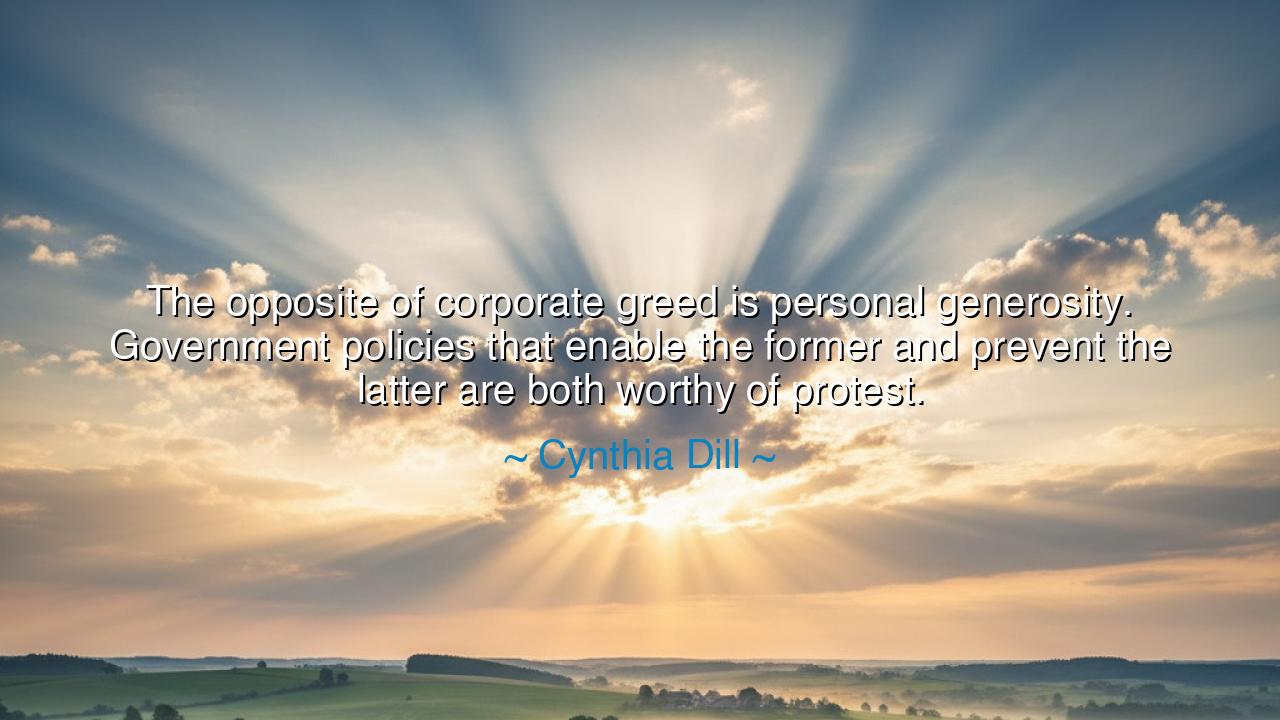
The opposite of corporate greed is personal generosity.
The opposite of corporate greed is personal generosity. Government policies that enable the former and prevent the latter are both worthy of protest.






The words of Cynthia Dill shine like a torch in an age darkened by the shadows of wealth and want: “The opposite of corporate greed is personal generosity. Government policies that enable the former and prevent the latter are both worthy of protest.” These are not the soft musings of comfort, but the cry of a conscience awakened—a call to remember that true wealth lies not in possession, but in compassion. In these few words, Dill reveals the eternal struggle between the heart and the machine, between the sacred duty of giving and the soulless hunger for more. Her words speak to an era where nations measure progress by profit, yet lose sight of the moral balance that sustains a people’s spirit.
Corporate greed—that insatiable hunger of the few at the expense of the many—has been the downfall of empires and the sorrow of civilizations. From the merchants of Rome who bought the Senate with gold, to the industrial barons of the modern world who chained the poor with debt instead of iron, greed has ever been the silent tyrant of the human story. But Dill’s wisdom does not rest merely in condemnation; she reminds us that the cure for greed is not envy, nor anger, but personal generosity—the will of one soul to give freely where the system withholds. For every empire of avarice, there has always arisen a light of kindness, a heart that defies the cold logic of profit by remembering the warmth of humanity.
Let us recall, as the ancients would, the story of Andrew Carnegie, the steel magnate of America. He was once a man of immense wealth, whose factories fed the furnaces of progress but consumed the sweat of countless laborers. Yet in his later years, he came to a revelation that mirrors Dill’s truth: that riches hoarded bring no honor, but riches given may uplift the world. He built libraries, universities, and halls of learning, planting seeds of knowledge that would outlast his empire of steel. In this, we see the transformation of greed into generosity—the awakening of the soul that realizes wealth is not meant to be stored but shared.
Dill warns, however, that the sickness of greed does not thrive by itself; it is often nourished by policy and protected by law. When governments bow to the idols of commerce, when they favor the powerful few and burden the humble many, they betray the covenant between ruler and citizen. For the purpose of government is not to feed the engines of profit, but to guard the welfare of its people. When the law defends greed and hinders generosity—when charity is taxed, when kindness is drowned in bureaucracy, when compassion is made suspect—then the spirit of democracy grows ill. In such times, Dill calls us not to silence, but to protest—the righteous voice of the citizen who remembers that justice begins not in policy, but in the heart.
Throughout history, the downfall of the mighty has come not from rebellion of arms, but from the erosion of virtue. The French kings fell not only because of famine, but because they forgot mercy. The markets of the Great Depression collapsed not only from speculation, but from the worship of greed. And yet, in every age of corruption, there arise those who give—the teachers who labor for little, the healers who serve the poor, the citizens who share what they have when the world withholds. Personal generosity is not weakness; it is rebellion of the purest kind, for it defies a culture that measures worth in gold.
Therefore, my children of the future, remember this sacred balance: wealth is not evil when it serves the good, and government is not corrupt when it guards the just. But when both forget the dignity of the human soul, when they serve greed instead of generosity, then the time for words has passed and the time for righteous action begins. Protest not with hatred, but with courage; not with destruction, but with creation. Build what greed destroys. Give where power hoards. Speak where silence has become complicity.
The lesson is clear and eternal: the true wealth of a nation lies not in its corporations, but in its citizens’ compassion. A generous heart is stronger than a gilded throne, for it builds legacies that no fortune can buy. Let your generosity be your rebellion, your kindness your protest. For when men give freely, greed loses its throne, and when justice returns to the heart, the world is renewed. Thus, as Dill teaches, the answer to greed is not vengeance—but generosity, fierce and unyielding, shining as the soul’s defiance against the cold empire of profit.






AAdministratorAdministrator
Welcome, honored guests. Please leave a comment, we will respond soon